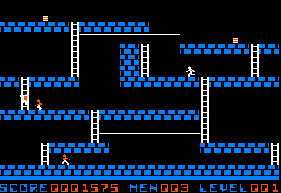 Lode Runner, a game many of us logged hundreds of hours upon. Lode Runner has a great deal of replay value thanks to its great map editor. The game was first published by Broderbund in 1983, but was first prototyped by Douglas Smith, an architecture student at the University of Washington.
Lode Runner, a game many of us logged hundreds of hours upon. Lode Runner has a great deal of replay value thanks to its great map editor. The game was first published by Broderbund in 1983, but was first prototyped by Douglas Smith, an architecture student at the University of Washington.
The Lode Runner prototype was called Kong and was originally written for a Prime Computer 550 minicomputer on campus, but shortly after it was ported to the VAX minicomputer. Originally programmed in FORTRAN and utilized only ASCII character graphics (the most basic of characters).
In September of 1982 Smith was able to port it to the Apple II+ (in assembly language) and renamed it to Miner. In October of that same year he submitted a rough copy to Broderbund and he’s said to have received a one-line rejection letter, “Sorry, your game doesn’t fit into our product line; please feel free to submit future products.”
The original title had no joystick support and was developed in full black and white…not exactly exciting. So, Smith then borrowed money to purchase a color monitor and joystick and continued to improve the game. Around Christmas of 1982, he submitted the game, now renamed Lode Runner, to four publishers and quickly received offers from all four: Sierra, Sirius, Synergistic, and Brøderbund.
(more…)
Podcast: Play in new window | Download

